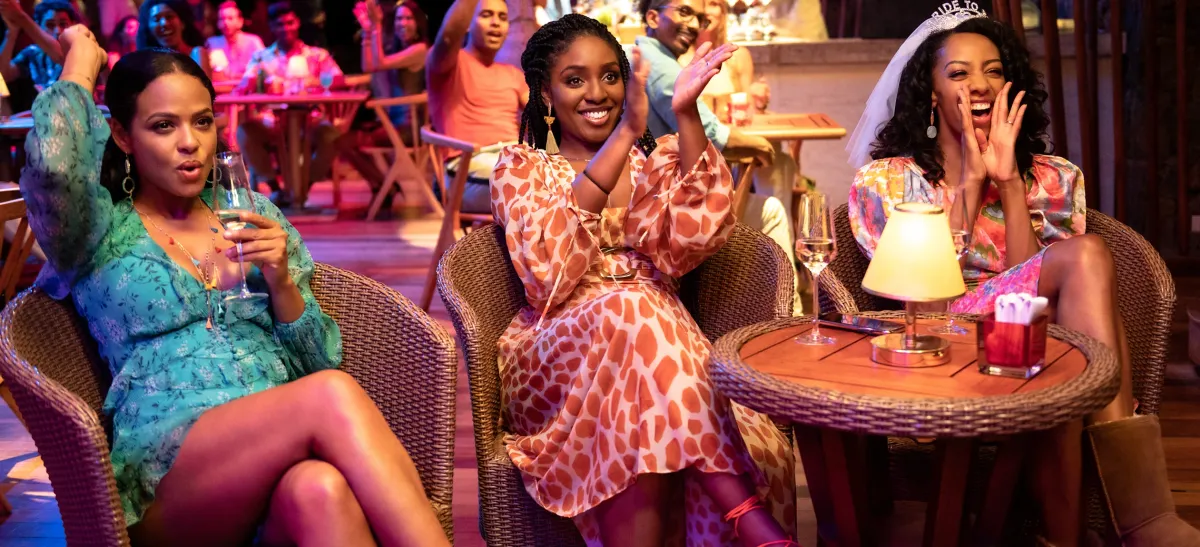Black Women Aren’t Given Their Flowers On and Off Screen
Ironically, the highest consumers of rom-coms are still underrepresented on-screen.

Access the Audio Read version of this article directly on Spotify for Podcasters.
I was about nine when I watched a romantic comedy for the first time. My aunts loved rom-coms, and one night, I snuck and joined them as they were engrossed with Sleepless in Seattle. Nothing compared to it; it was different from the intense, passionate films I had seen before, in which people’s love suffered severe complications in its climax and barely survived just before the credits rolled. This new genre was packed with fresh, humorous gestures, and an entertaining turn of events.
When my aunts moved out, I picked up right where they had stopped. I rewatched all their classics, from When Harry met Sally to You’ve Got Mail, until their DVDs cracked. Soon after, I graduated to watching them on our cable TV, where a variety of fun romantic comedies aired. This drove my fondness to the point of obsession. I anticipated holidays with much fervour because they meant stellar cheesy romance. As a teen, my boarding school breaks were spent consuming various forms of romantic storylines, from highschool love to becoming of age plots. I enjoyed this routine for years until it morphed into an unappealing chore.
What changed? I turned 16 and became acutely bored of bingeing on unrelatable white love. I watched Love Don’t Cost a Thing, starring Christina Milian and Nick Cannon, and it occurred to me that the rom-coms I had watched until then were lacking something pretty important: colour.
Where are the Black women in Hollywood rom-coms?
Throughout the golden era of rom-coms, from the 90s to early noughties, white women dominated the TV rom-com genre, and were praised for it exceedingly more than Black actresses. They played the female lead character who locks gaze with a young chap across the room, who coincidentally bumps into the same (white) guy on her morning run and somehow receives a breathtaking flower bouquet later that day, and it is a nearly smooth sail from there on to happily-ever-after.
Today, the genre has evolved, and the spotlight has shifted away from it, as rom-coms rarely rank amongst the top grossing films anymore. Although wholesome romantic movies are released all year, its popularity spikes only during holidays like Valentine’s Day and Christmas. But one thing remains the same: the mainstream romantic comedy scene still predominantly places white women as the recipients of this highly spirited brand of love. In a few movies that attempted inclusion, Black women, at best, play supporting roles where they are removed from the romantic centre-stage and watch their friend or frenemy get their flowers.
In Vogue’s listicle ‘70 Best Romantic Comedies of All Time’, only three Black love dramas were given recognition out of the 73 that made the cut. Narrowing it down, a Google search for 'Black rom-coms' will display a selection of plain romantic comedies, supporting the fact that there are not nearly enough movies that fit the description. It is ironic that people of colour, the highest consumers of rom-coms according to Statista, are still underrepresented on-screen.
The white conditioning runs deep
After my first encounter with Black rom-coms, I instantly developed a predilection for them. Since they rarely showed on TV, I resorted to seeking pirated copies — of Brown Sugar, Love and Basketball, How Stella Got Her Groove Back, and Think Like a Man among others — from friends who shared similar tastes. But I discovered this constant exposure to white-only love impacted my perception of romance and race at an impressionable age. Even as I watched these Black characters, it felt unnatural to see girls and women of my skin tone bask in romantic attention. It seemed like an appropriation of culture, when in reality, it wasn't. Rom-com boils down to two fundamental elements which are love and joy, and there is no better representation of Blackness than these two themes.
A lack of understanding of this specific idea forms the basis for the criticism Black women receive when they express their desire for romantic gestures, whether subtle or showy, such as receiving handwritten notes or giant bouquets. We are often ironically reminded that these desires are an acquired taste from years of white rom-com conditioning.
This idea that the genre exists far from our reality is itself flawed. First, the on-screen portrayal of love doesn't typify white women's experiences. Second, these criticisms fail to realise that so much of Black life is characterised by love, experienced through difficulty and ease. The latter is what rom-coms amplify: vibrant romance embellished with light-hearted humour.
Reality is undoubtedly harsh, especially for dark skinned people, but romantic comedies provide much-needed respite. Their predictable storylines and formulaic plot offer an irresistible escape, and indulging in them is one of the oldest selfcare tips known to Black women. This pursuit of realism explains the repetitive narration of politically aware stories and the pigeonholing of Black actresses into roles that capture them perpetually fighting for their lives and rights.
On women giving themselves flowers and reclaiming power
To even out this disparity, Black women have taken charge of granting themselves great happy-ending stories. Historically, the majority of highest grossing Black rom-coms were achieved with Black-led production teams, from John Singleton's Poetic Justice to Rick Famuyiwa's Brown Sugar.
Black women are now demanding nuanced romantic depiction of themselves, as revealed in a 2021 survey from the Oprah Winfrey Network and National Research Group, and it's heartwarming that other women are rising to the event. Black women have understood that on-screen changes can only be effected from behind the scenes, and now, they are ensuring every front is covered. From writing, to producing, and to directing, these women are creating fun and relatable characters to embody our humorous nature, complex personalities, and showcase the full glory of Black love. Stella Meggie brilliantly wrote and directed The Photograph, starring Issa Rae and Lakeith Steinfield. In 2021, Christina Milian starred in Resort to Love, a film produced by Alicia Keys. They are proof that the future of immersive Black rom-coms is promising.
For now, I'm just pleased my rom-com watchlist has more Black faces, an upgrade from last year.





